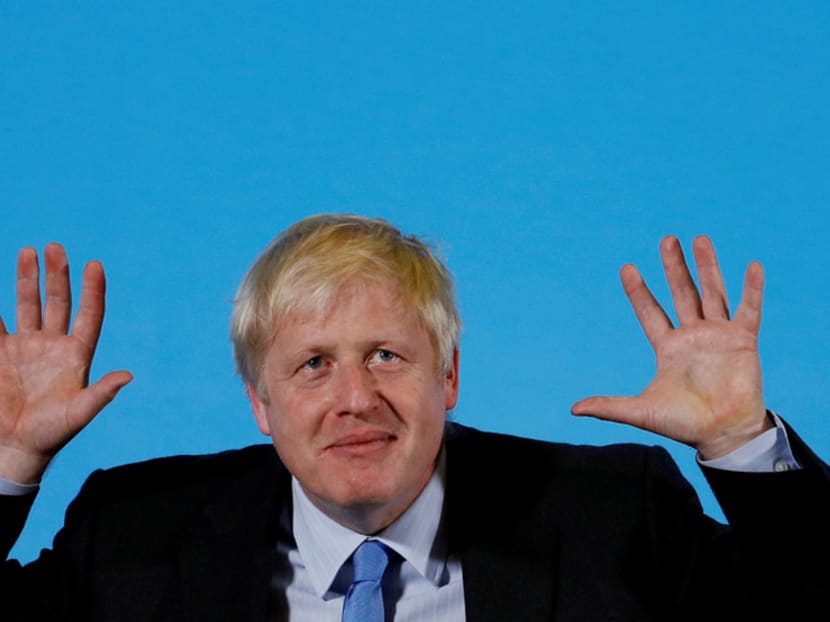Explainer: Why new British PM Boris Johnson could have a big impact on global economy
SINGAPORE — Charismatic, mop-haired and gaffe-prone Boris Johnson has fulfilled what biographers have called his “blond ambition” to become British prime minister.

Flamboyant Boris Johnson, former London mayor and champion of Brexit, has much on his plate now that he has become United Kingdom's prime minister.
SINGAPORE — Charismatic, mop-haired and gaffe-prone Boris Johnson has fulfilled what biographers have called his “blond ambition” to become British prime minister.
A former colourful mayor of London, he trounced the other candidate, British Foreign Secretary Jeremy Hunt, by a margin of about two votes to one on Tuesday (July 23) after a ballot among ruling Conservative Party members.
Mr Johnson, 55, who started his working life as an attention-grabbing journalist after an elite education at Eton College and Oxford University, officially took over from Prime Minister Theresa May on Wednesday.
He may have got the job he always wanted, but some commentators say Britain faces its greatest challenges since World War II.
WHY THE CHANGE IN BRITISH PM?
For more than three years, British politics has been consumed by Brexit — a contraction of “British exit”. On June 23, 2016, in a shock outcome, Britons voted by a margin of about 52 per cent to 48 per cent to leave the European Union (EU).
Mr Johnson had led the winning “leave” campaign. For three years, Mrs May tried to get a Brexit deal through her party and parliament, but failed repeatedly. One of her harshest critics was Mr Johnson, who served for a time under Mrs May as a gaffe-prone foreign secretary.
Crushed by the pressure of her failure to carry out Brexit, Mrs May announced in May that she would stand down.
WHY DID BORIS JOHNSON WIN?
Mr Johnson pledged to get Brexit done by the latest deadline set by the EU, Oct 31, with or without a so-called “divorce deal” with the EU.
Britain’s economy is deeply enmeshed with the EU. A deal would make the Brexit process more orderly, but striking such a deal is very complicated. Some observers, including some of Mr Johnson's colleagues, fear a "no-deal" Brexit could spell economic chaos.
Some of his senior colleagues are already quitting — or vowing to quit — unless he changes his position on a no-deal Brexit. But this was one key factor that led Conservative Party members to vote for him.
He is also popular. As London mayor at the time of the 2012 Olympics, Mr Johnson, waving British flags, got stuck on a zipline as he tried to make a spectacular entrance to a venue near the Olympic stadium. He was left dangling awkwardly, calling for a ladder — but instead of attracting ridicule, he seemed to grow in popularity.
WHAT IS WRONG WITH A NO-DEAL BREXIT?
If Britain crashes out of Europe without a deal, it will be left with no formal trading arrangements with the EU — a huge market, especially for Britain. It also has many legal and logistical connections with the EU.
One key problem is dealing with the land border between Northern Ireland — part of the United Kingdom — and the Republic of Ireland, an EU member state.
Many Conservative members of parliament are opposed to a “hard” Brexit, resulting from no deal — a potential political problem for Mr Johnson.
Ms Selena Ling, head of treasury research and strategy at Singapore bank OCBC, told TODAY that a no-deal Brexit could be economically disruptive. “The common presumption is that a no-deal Brexit will be messy for both financial markets and trade, hence the (British pound) is already feeling the pressure as the deadline draws near.”
Associate Professor Chong Ja Ian from the National University of Singapore (NUS), a political scientist, said: “Singaporeans should care because any disruption Brexit could cause in Europe has the potential to affect the global economy, which may in turn affect Singapore. Should Brexit distract the UK and Europe from supporting international institutions and rule of law that have so far benefited Singapore, that could be of concern to Singaporeans, too.”
IS BORIS JOHNSON REALLY BRITAIN’S TRUMP?
United States President Donald Trump was quick to congratulate Mr Johnson whom he called a “Britain Trump”. Like his US counterpart, Mr Johnson is no stranger to controversy. Both men have been accused of being loose with the truth and both have also faced scrutiny over their private lives, and involvements with women.
Born in New York and initially holding both American and British citizenship, Mr Johnson was infamously sacked by The Times newspaper for fabricating a quote in a front-page article, which he went on to describe as his “biggest cock-up”.
Dr Yeo Lay Hwee, director of the EU Centre in Singapore, told TODAY that some voters tend to sway towards controversial politicians.
“It is a worrying trend in politics that people’s general disenchantment and the ‘white backlash’ has led to a situation where important players (such as the US and UK) in the international arena are led by bombastic, narcissistic and morally bankrupt politicians.”
However, Assistant Professor Walid Jumblatt Abdullah of Nanyang Technological University's School of Social Sciences’ public policy and global affairs programme, said that he does not see as strong a similarity between Mr Trump and Mr Johnson.
"I can see why people compare the two, because both are loud, outrageous and larger-than-life personalities. They have both made some disturbing comments about race and ethnicity before, though Trump's are decidedly more disconcerting," Asst Prof Walid said.
"However, there are key differences. Boris has had political experience before, and served in the highest positions in cabinet. He was also the mayor of London, a cosmopolitan, multi-racial city which usually votes Labour.”
WHAT IS THE EUROPEAN UNION SAYING NOW?
The EU has repeatedly stated it will not negotiate a fresh Brexit deal, having already spent many hours settling a deal with Mrs May, then working to amend that deal.
The vice-president of the European Commission, Mr Frans Timmermans, drove the point home on Tuesday: "EU position is clear: The UK reached an agreement with the EU and the EU will stick with that agreement".
WHAT DOES IT ALL MEAN FOR SINGAPORE?
OCBC’s Ms Ling said that despite the possible negative effects of a no-deal Brexit, there could be opportunities, such as Singapore seeing some "safe-haven flows from any ensuing flight to quality", or people moving money to safer investments.
She also said that there might be some short-term hiccups in business and trade flows given the extended uncertainty, but some Singapore firms might eye opportunities in Britain given the weaker pound, for example.
Assoc Prof Chong from NUS said: “A Johnson government should not have much of a direct impact on Singapore, since I expect trade and investment with the UK to continue and probably grow somewhat as UK businesses continue to try and find opportunities outside Europe.”
Taking a different tack, Asst Prof Walid said that he is more concerned about how Mr Johnson’s leadership may affect attitudes to minorities.
“Although Boris has apologised for many of his racially disturbing comments, unlike Trump, he still has a history of making them. His election seems to be in line with a more nativist approach to politics, as embodied in the election of far-right personalities throughout Europe. The worry is that the election of individuals like him emboldens such ethno-centric behaviour from ordinary people.”
WHAT OTHER CHALLENGES DOES BORIS JOHNSON FACE?
Arguably, Mr Johnson’s most pressing foreign policy challenge, outside of Brexit, is the escalating crisis involving Iran.
On July 19, Iran seized a British-registered oil tanker in the Strait of Hormuz, claiming it had collided with a fishing boat.
The incident has increased tensions between Iran and the West, which have been simmering since Mr Trump scrapped a nuclear deal with Iran brokered by world leaders, including his predecessor Barack Obama.








